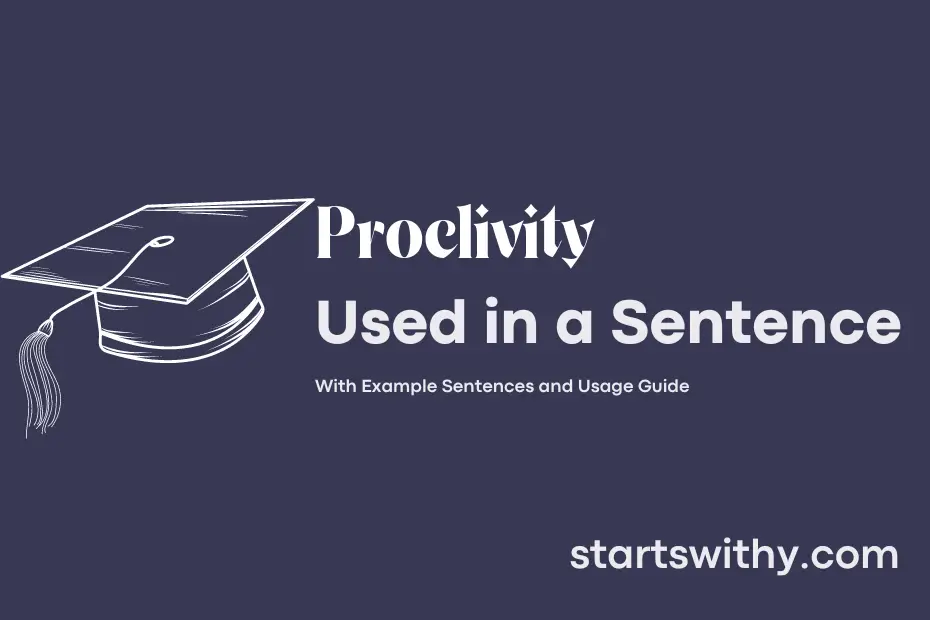Do you often find yourself naturally inclined towards certain behaviors or preferences? This tendency or natural inclination is commonly referred to as a “proclivity.”
A proclivity is a strong inclination or predisposition towards a particular behavior, activity, or way of thinking. It often reflects our individual preferences and tendencies, influencing the choices we make and the paths we take in various aspects of our lives.
7 Examples Of Proclivity Used In a Sentence For Kids
- Proclivity means a strong liking or tendency.
- She has a proclivity for drawing and painting.
- He has a proclivity for playing musical instruments.
- I have a proclivity for helping others.
- They have a proclivity for dancing and singing.
- My friend has a proclivity for reading books.
- We all have different proclivities that make us unique.
14 Sentences with Proclivity Examples
- Proclivity towards procrastination often hinders college students from achieving their academic goals.
- College students with a proclivity for socializing may struggle with time management in balancing studies and extracurricular activities.
- Developing a proclivity for seeking help from professors and peers can greatly enhance a student’s learning experience.
- Having a proclivity for attending seminars and workshops can broaden a student’s knowledge beyond the classroom.
- Students with a proclivity for technology may excel in subjects related to computer science and engineering.
- Building a proclivity for critical thinking is essential for success in competitive exams and entrance tests.
- College students who have a strong proclivity for writing may consider pursuing a career in journalism or content creation.
- Balancing a proclivity for sports with academic commitments requires discipline and effective time management skills.
- A proclivity for exploring new ideas and perspectives can enrich a student’s overall college experience.
- Cultivating a proclivity for networking can open doors to internships, job opportunities, and career growth.
- Nurturing a proclivity for public speaking can boost a student’s confidence and communication skills.
- Students with a proclivity for creativity may thrive in fields such as design, fashion, or the arts.
- Developing a proclivity for research can enhance the quality of academic projects and assignments.
- College students with a proclivity for volunteering often find fulfillment in giving back to their community.
How To Use Proclivity in Sentences?
To use Proclivity in a sentence, start by identifying a strong inclination or preference towards a particular activity, behavior, or feeling. For example, “She has a proclivity for playing the piano,” means that she has a natural tendency or strong liking for playing the piano.
When constructing a sentence with Proclivity, ensure that the context makes it clear what the inclination or preference is towards. It is often used to describe someone’s predisposition or behavior in a certain area.
Remember that Proclivity is formal language and is typically used in written communication or more serious conversations. It is not commonly used in casual speech.
To improve your sentence structure and avoid repetition, you can use synonyms or related words to Proclivity such as tendency, penchant, inclination, leaning, or predisposition.
Lastly, make sure your sentence is clear, concise, and grammatically correct. Consider using Proclivity when you want to convey a strong preference or bias towards something in a sophisticated manner.
Here is an example sentence using Proclivity: “Despite his talent in various sports, his true proclivity lies in playing basketball.”
Remember, practice makes perfect! Try incorporating Proclivity into your writing to become more comfortable using it in sentences.
Conclusion
In conclusion, the sentences provided illustrate the diverse ways in which the term “proclivity” can be incorporated into writing to convey a tendency or inclination towards a particular behavior or attitude. By showcasing examples such as “She has a proclivity for taking risks” or “His proclivity for procrastination often leads to late submissions,” the versatility of the term in representing individual preferences and habits is evident.
Overall, these sentences emphasize the importance of understanding and recognizing one’s proclivities, as they can influence decision-making, relationships, and overall life choices. By acknowledging and embracing these inherent tendencies, individuals can navigate their personal and professional lives with a deeper insight into their unique predispositions, ultimately leading to a greater sense of self-awareness and fulfillment.



